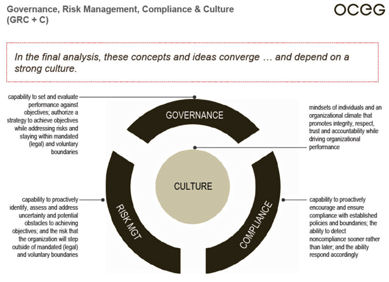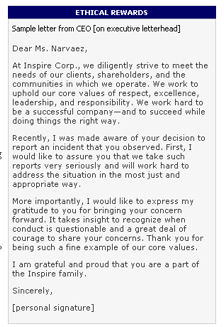The Concepts of Ethics/integrity are not as difficult to grasp as quantum physics and yet corporate leaders just don’t seem to get it when in comes to Corporate Governance.
“… that since Enron, businesses are focusing more on compliance with the law than on building cultures where lying isn’t tolerated.” Patricia Harned, president Ethics Resource Center December 2007
This must be reversed, Boards and C-suite management must now go beyond compliance and build a culture in which ethics is the norm.
Open Compliance and Ethics Group
While employees generally can be expected to be honest, corporate governance matters can be involved and must be provided with the context and motivation to do their work with the highest ethical standards. This falls to the Board and C-suite management.
An organization’s culture includes the formal and informal norms that guide how people behave at work. The Board and senior management set the “tone at the top” regarding establishing an ethical culture. This is more that crafting a credible code of ethics. An essential starting point is that Directors and the C-suite need to focus on good ethical practices not as a cost of business but as an investment in building the firm’s reputation that in turn will lead to enhanced financial performance.
The Board and the C-suite, through their words and actions, establish the expectations that provide guidance for crafting and maintaining an effective ethical culture. This is an example of what can be done to promote ethical cultures.
Finally, here is an Ethics Quiz that may be useful to highlight areas that should be considered.


 Marketers can learn a lot from celebrities and the PR machines behind them. As crazy as it might seem, take some time over the next week to listen to celebrity gossip on television and read about it online. Celebrities work hard to keep their names in the spotlight, drumming up positive publicity and putting out the fires of negative publicity.
Marketers can learn a lot from celebrities and the PR machines behind them. As crazy as it might seem, take some time over the next week to listen to celebrity gossip on television and read about it online. Celebrities work hard to keep their names in the spotlight, drumming up positive publicity and putting out the fires of negative publicity.